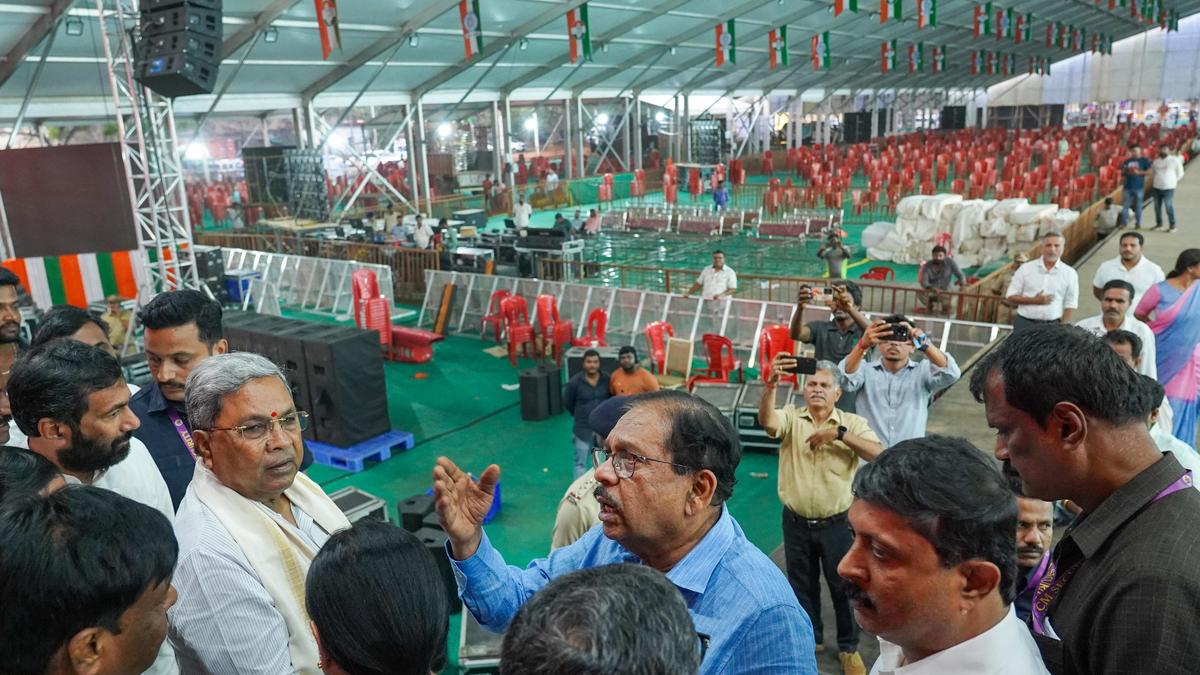
Chief Minister Siddaramaiah inspecting the photo exhibition and preparations for the centenary celebrations of the 39th Congress session, in Belagavi on Wednesday. | Photo Credit: special arrangement
“Only death can prevent me from visiting Belgaum”, was what Mahatma Gandhi wrote in a letter to Gangadhar Rao Deshpande, veteran Congress leader and Khadi activist, in 1916.
The people of Belgaum (now Belagavi) had invited Gandhiji within a year of his arrival from South Africa. This was to attend the first session of the Home Rule League to be held in the city. He was to share the dais with leaders like Annie Besant and Bal Gangadhar Tilak. However, some leaders who were not comfortable with the idea of a sub-group within the Congress asked him not to go.
The first visit
Deshpande, who was one of the four AICC general secretaries, hailed from Hudali in Belgaum district and was in favour of Gandhiji visiting. He wrote to him and got that reply. That was the first visit of the Father of the Nation to Belgaum.
He was to return to the lush green surroundings of the town three more times. The third was to chair the 39th All-India Congress session in 1924.
However, in 1924, Gandhjiji was reluctant to come to the city, as he thought his time would be better spent to heal the differences in riot-hit areas in north India. The organisers finally prevailed on him.
The session turned out to be important since his chairmanship changed the organisational structure and the functioning style of the Congress.
He discussed his dream of ‘Swaraj’ and ‘Sarvodaya’ here. He seems to have achieved significant success in changing the Congress from a political agency to an agent of change, aimed at fighting for social and economic freedom. Apart from the routine sessions, the Belgaum session held separate conferences against untouchability and in favour of khadi and village industries, students, municipal administration, and formation of States on linguistic grounds. Strong resolutions were passed to stress upon Hindu-Muslim unity, paid social service and making khadi spinning mandatory.
Reduced fee
As chairman of the session, Gandhiji reduced the annual membership fee by 90% and urged all party members to realise that the Congress was a movement, and that they were all social workers, working not only for political liberation from the British rule, but also from social evils like untouchability.
The most important aspect of the session seems to be focus on khadi and village industries. The chairman introduced a resolution making it mandatory for every member to submit to the party local committee, 2,000 yards per month of hand-spun khadi cloth, payable in advance.
In case of exceptional circumstances, the member had to pay someone to spin the cloth and submit, instead.
The session also brings out an aspect of Gandhiji’s life that had not been explored much. He addressed two meetings of party workers on urban development and town planning. He held a separate session on untouchability eradication, and his statement there is now famous: “If I am to be born again, may I be born a Bhangi.”
In digital archive
Several details of the historic Belgaum session are documented in the Collected Works of Mahatma Gandhi, Volume 25. They are digitised by Servants of Knowledge, a Bengaluru-based not-for-profit, and uploaded on archive.org.
On cow protection
In a session on cow protection, Gandhiji stressed on cow being a tool for farmers for their economic upliftment. He urged farmers to use cows that have stopped giving milk as draught animals to till their fields and cited a successful example from Lahore. He clarified in strong words that his advocacy for cow protection does not mean violence against communities like Muslims, who consume beef. “That would be forcibly converting them to Hinduism. That is not acceptable,’‘ he said.
Sanitation volunteers
Belgaum Impressions, an editorial he wrote in Young India after the session, has some interesting details. He said the sanitation volunteers, who were working in a group led by Kaka Karkhanis and N.S. Hardikar, were engaged in filling dry toilets. He observed that 40 of the 70 volunteers were Brahmins. Gandhiji took objection to the expenditure on the session, especially in providing benefits to VIPs. He urged organisers of the next session to reduce it, by treating all members as equals.
Some great music
The session was unforgettable for lovers of art and music. Hindustani maestro Vishnu Digambar Paluskar and a 11-year-old Gangubai Hangal sang songs. The Kannada song “Udayavagali Namma Chaluva Kannada Nadu” by playwright Huilgol Narayana Rao, was sung on the first day.
A special well
A huge well dug for the purpose of serving invitees of the Congress session, named Pampa Sarovara, is still supplying water to parts of south Belagavi.
Published – December 26, 2024 07:05 am IST


